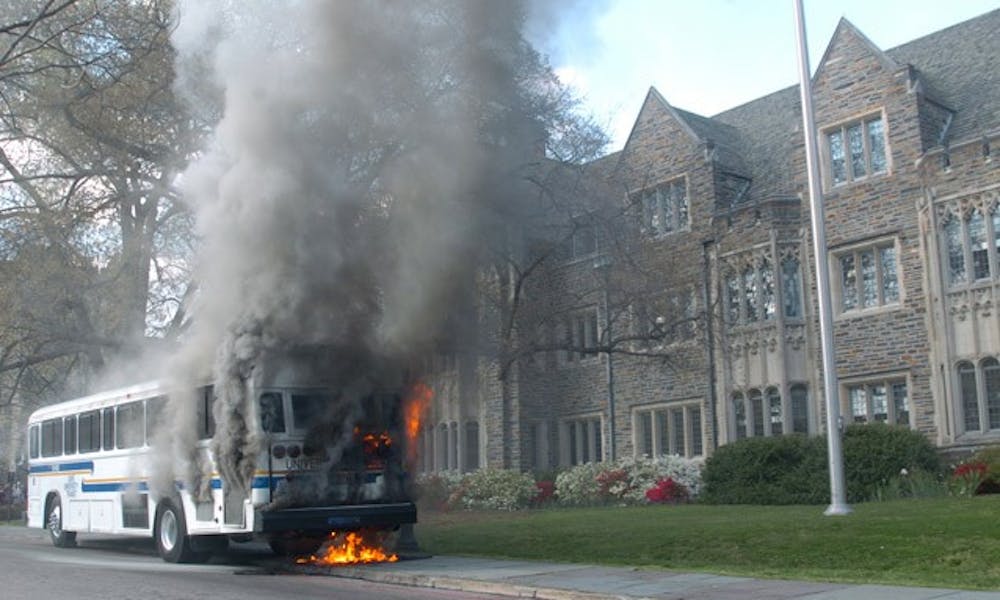A bus that caught fire last week and three others in Duke’s fleet should have been recalled, Vice President for Campus Services Kemel Dawkins confirmed.
Based on the results of a preliminary investigation, administrators have concluded that the Oct. 14 C-1 bus fire resulted from a problem with the electrical wiring near the vehicle’s wheelchair lift, Dawkins said.
A batch of Bluebird school buses manufactured in the late 1990s were found to have electrical wiring problems in the same location and recalled by the manufacturer, he said. Administrators did not learn of the recall until Wednesday afternoon.
“We did not know anything about that recall, and we were not notified,” Dawkins said, adding that he did not know when the recall was announced.
The charred bus—which caught fire shortly after pulling away from the East Campus bus stop—is no longer in service. The Department of Parking and Transportation will examine all buses in the coming weeks, but the other three Bluebird vehicles manufactured in the late 1990s have been taken off the road for further investigation, Dawkins said.
“We have scheduled the three remaining [Bluebird] buses that we have for a complete investigation that we are going to do with a fine-toothed comb over the next couple of days,” he said. “We don’t know if there are defects with those buses, but we want to be absolutely sure.”
Duke has rented vehicles from Carolina Livery to sustain its regular routes without the four buses.
Sophomore Lauren Pfeiffer traveled across campus in one of Carolina Livery’s 10-person vans rather than her usual C-1 Wednesday. She said last week’s fire has made her think twice about her safety on Duke’s buses.
“The driver [of the Carolina Livery van] talked to us the entire way, and he described all the other buses as ticking time bombs,” Pfeiffer said. “It makes me a little scared to get on a C-1. People ride them every day, so they should make sure they are safe.”
Duke buses have caught fire three times since the Department of Parking and Transportation began its records 27 years ago, Dawkins said. In Spring 2006, the engine compartment of a C-1 parked at the Main West Campus bus stop caught fire. Dawkins did not know when the third fire took place.
C-1 Driver Mike Eubanks, who has worked at Duke since 2008, said buses go up in flames periodically, but last week’s fire was the worst he has seen in his 20-year career.
“[Bus fires] happen but I would say that they are uncommon,” Dawkins said. “Any motor vehicle is susceptible.... You’ve got lots of different systems operating on a bus. It’s one of the problems that comes with running a transportation fleet.”
Duke buses are inspected daily before they ever pick up students, in addition to “preventative maintenance inspections” every 90 days, Dawkins said. Once a year, Duke’s fleet is also examined by an outside agency.
The C-1 that caught fire last Wednesday underwent its 90-day inspection Sept. 22 and Sept. 23. After that time, four minor repairs were performed on the bus, but there were no signs that the vehicle had a wiring problem, Dawkins said. The bus’s daily inspection did not reveal anything unusual the day of the incident, and Dawkins said he does not think the fire could have been prevented.
“I feel very confident about the safety of the fleet as a whole, and I feel confident in our processes of inspecting and maintaining the buses,” he said.
C-1 Driver Nancy Colon, who has worked at Duke since 2008, said she and other drivers have had more problems than usual with the buses since the school year began in August. She said she has noticed a shortage of both drivers and vehicles, estimating that at least three new buses are needed. But she doubts the department will be able to find funding for these ventures in this economy.
“There’s no hiding the fact that we all know that we need new buses—the buses are just run down,” she said. “We have been complaining, but the change has to come from students. You are the ones who pay to make this place run.”
Dawkins said plans to buy new buses have been in the works for some time, and administrators hope to add new vehicles to the fleet within the next year. He added that the economy has not affected the timetable for acquiring the buses.
Shuttling from East to West Campus on a late-night C-1, sophomore Kevin Lieberman said he doesn’t question his safety on Duke’s buses.
“Every so often there’s going to be an incident, but I feel the buses are safe,” he said. “My first reaction to the news of the fire, because no one was hurt, I didn’t find it shocking. These buses are old.”
Eubanks said he has complete confidence in Duke’s fleet, noting that he would trust any of his family members on his bus. But he added that last week’s fire has given him and other drivers pause as they go about their routes each day.
“I’ve heard a couple of drivers comment that it makes them think,” he said. “These buses can be replaced—human safety cannot.”
Get The Chronicle straight to your inbox
Signup for our weekly newsletter. Cancel at any time.

